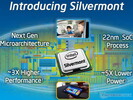
Test HP Pavilion 11-n070eg x360 Convertible
Intel Celeron N2820 | Intel HD Graphics (Bay Trail) | 11.60" | 1.5 kg

Der Intel Celeron N2820 ist ein sparsamer Dual-Core-SoC aus dem Einstiegssegment. Er taktet mit bis zu 2,4 GHz und gehört der Bay Trail-M Plattform an. Dank eines speziell für Low-Power-Chips optimierten 22-Nanometer-Prozesses (P1271) mit Tri-Gate-Transistoren konnte die Performance sowie die Energieeffizienz gegenüber dem Vorgänger deutlich gesteigert werden.
Architektur
Die Prozessorkerne basieren auf der neuen Silvermont-Architektur, welche erstmals bei einem Atom-Prozessor als Out-of-order-Design ausgeführt wurde. Die dadurch erhöhte Auslastung der Pipeline sowie viele weitere Detailverbesserungen (optimierte Sprungvorhersage, vergrößerte Buffer, verbesserte Decoder) sollen die Pro-MHz-Leistung um etwa 50 Prozent steigern. Gleichzeitig entfällt allerdings das Hyper-Threading-Feature der Vorgängermodelle. Weitere wichtige Änderungen umfassen die Unterstützung neuer Befehlssatzerweiterungen wie SSE 4.1 und 4.2 sowie AES-NI (modellabhängig).
Performance
Dank der verbesserten Mikroarchitektur übertrifft insbesondere die Single-Thread-Performance bisherige Atom-Modelle wie den Z2760 deutlich. Insgesamt liegt der Celeron N2820 in Schlagdistanz zu preiswerten Einstiegs-CPUs von AMD wie dem E1-2500, sodass ausreichende Leistungsreserven für die meisten Office- und Multimedia-Anwendungen bestehen. Anspruchsvollere Software wird den Einstiegs-SoCs hingegen schnell überfordern.
Grafik
Die HD Graphics (Bay Trail) basiert auf Intels-Gen7-Architektur, welche DirectX 11 unterstützt und auch bei den Grafiklösungen der Ivy-Bridge-Serie (z.B. HD Graphics 4000) zum Einsatz kommt. Mit nur 4 EUs und maximal 756 MHz Taktrate fällt die Leistung aber noch deutlich niedriger als bei der HD Graphics (Ivy Bridge) aus, sodass nur ältere und weniger anspruchsvolle Windows-Spiele flüssig dargestellt werden. Obwohl selbst dies ein drastischer Fortschritt gegenüber dem Vorgänger ist, reicht die GPU-Performance nicht an konkurrierende AMD-APUs heran.
Leistungsaufnahme
Der gesamte SoC wird von Intel mit einer TDP von 7,5 Watt spezifiziert, sodass der Chip auch in sehr kompakten Subnotebooks oder Tablets eingesetzt werden kann. Bei typischer Nutzung soll die Leistungsaufnahme bei nur 4,5 Watt liegen (SDP).
| Codename | Bay Trail-M | ||||||||||||||||||||||||||||||||||||||||||||||||||||
| Serie | Intel Celeron | ||||||||||||||||||||||||||||||||||||||||||||||||||||
Serie: Celeron Bay Trail-M
| |||||||||||||||||||||||||||||||||||||||||||||||||||||
| Taktung | 2170 - 2390 MHz | ||||||||||||||||||||||||||||||||||||||||||||||||||||
| Level 1 Cache | 112 KB | ||||||||||||||||||||||||||||||||||||||||||||||||||||
| Level 2 Cache | 1 MB | ||||||||||||||||||||||||||||||||||||||||||||||||||||
| Anzahl von Kernen / Threads | 2 / 2 | ||||||||||||||||||||||||||||||||||||||||||||||||||||
| Stromverbrauch (TDP = Thermal Design Power) | 7.5 Watt | ||||||||||||||||||||||||||||||||||||||||||||||||||||
| Herstellungstechnologie | 22 nm | ||||||||||||||||||||||||||||||||||||||||||||||||||||
| Max. Temperatur | 105 °C | ||||||||||||||||||||||||||||||||||||||||||||||||||||
| Socket | FCBGA1170 | ||||||||||||||||||||||||||||||||||||||||||||||||||||
| Features | HD Graphics (Bay Trail, 313 - 756 MHz), Wireless Display, Speedstep | ||||||||||||||||||||||||||||||||||||||||||||||||||||
| GPU | Intel HD Graphics (Bay Trail) (313 - 756 MHz) | ||||||||||||||||||||||||||||||||||||||||||||||||||||
| 64 Bit | 64 Bit wird unterstützt | ||||||||||||||||||||||||||||||||||||||||||||||||||||
| Architecture | x86 | ||||||||||||||||||||||||||||||||||||||||||||||||||||
| Anfangspreis | $107 U.S. | ||||||||||||||||||||||||||||||||||||||||||||||||||||
| Vorgestellt am | 01.12.2013 = 4164 days old | ||||||||||||||||||||||||||||||||||||||||||||||||||||
| Produktinformationen beim Hersteller | ark.intel.com | ||||||||||||||||||||||||||||||||||||||||||||||||||||

HP Pavilion 11-n071eg x360: Intel HD Graphics (Bay Trail), 11.60", 1.4 kg
Externer Test » HP Pavilion 11-n071eg x360
HP Pavilion 11-n070eg x360: Intel HD Graphics (Bay Trail), 11.60", 1.5 kg
Externer Test » HP Pavilion 11-n070eg x360
Toshiba Satellite NB10t-A-10F: Intel HD Graphics (Bay Trail), 11.60", 1.3 kg
Externer Test » Toshiba Satellite NB10t-A-10F
Toshiba Satellite C55-A5140: Intel HD Graphics (Bay Trail), 15.60", 2.3 kg
Externer Test » Toshiba Satellite C55-A5140
HP Pavilion 11-n008tu x360: Intel HD Graphics (Haswell), 11.60", 1.4 kg
Externer Test » HP Pavilion 11-n008tu x360
HP Pavilion 11-N000eo X360: Intel HD Graphics (Haswell), 11.60", 1.4 kg
Externer Test » HP Pavilion 11-N000eo X360
» Vergleich mobiler Prozessoren
Alle CPU Serien für Notebooks mit kurzer Beschreibung
» Mobile Prozessoren - Benchmarkliste
Sortier- und filterbare Benchmark-Liste